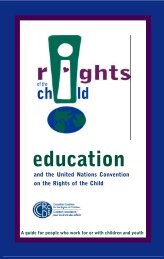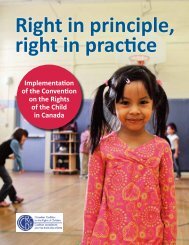Poste - Canadian Coalition for the Rights of Children
Poste - Canadian Coalition for the Rights of Children
Poste - Canadian Coalition for the Rights of Children
Create successful ePaper yourself
Turn your PDF publications into a flip-book with our unique Google optimized e-Paper software.
The provinces and <strong>the</strong> Yukon have policies that<br />
support inclusion but do not require it. However, <strong>the</strong><br />
Northwest Territories’ Education Act clearly states<br />
that “every student is entitled to have access to <strong>the</strong><br />
education program in a regular instructional setting in<br />
a public school or public denominational school in<br />
<strong>the</strong> community in which <strong>the</strong> student resides.” 117 The<br />
Yukon and Prince Edward Island both specify that<br />
<strong>the</strong> placement <strong>of</strong> students with disabilities is to be<br />
done in <strong>the</strong> “most enabling” education<br />
environment. 118<br />
The Department <strong>of</strong> Indian and Nor<strong>the</strong>rn Affairs does<br />
not have a <strong>for</strong>mal education policy <strong>for</strong> children with<br />
disabilities who live on reserve. According to<br />
researchers Stienstra and Kellerman, except <strong>for</strong><br />
Northwest Territories, inclusion in regular schools<br />
and classrooms <strong>for</strong> Aboriginal students with<br />
disabilities who live on reserve is unusual.<br />
Consequently, most Aboriginal children with<br />
disabilities do not remain on reserve. In order to<br />
access provincially-funded special education<br />
services, some Aboriginal parents place <strong>the</strong>ir children<br />
in <strong>the</strong> care <strong>of</strong> <strong>the</strong> state. The researchers also report<br />
that nongovernmental organizations <strong>for</strong> persons with<br />
disabilities are aware <strong>of</strong> Aboriginal parents being<br />
“frequently advised to relinquish guardianship in<br />
order that <strong>the</strong>ir children become eligible <strong>for</strong><br />
provincially-funded special education programs.” 119<br />
Despite provincial and territorial commitments<br />
to inclusive education, <strong>the</strong>re are no adequate<br />
en<strong>for</strong>cement or assessment mechanisms and<br />
little commitment to review policies and<br />
implementation. 120 The right to education <strong>for</strong> children<br />
with disabilities is approached on a case-by-case<br />
basis by pr<strong>of</strong>essional educators who assess each child<br />
and prescribe placement. There<strong>for</strong>e, <strong>the</strong> inclusion <strong>of</strong><br />
students with disabilities is not guaranteed and is<br />
dependent on school districts ra<strong>the</strong>r than provincial<br />
standards.<br />
The Roeher Institute has noted that a lack <strong>of</strong> clarity<br />
about inclusion has resulted in widespread confusion<br />
and variation across <strong>the</strong> country. Generally, provincewide<br />
inclusion standards do not exist so schools in<br />
<strong>the</strong> same province can have very different<br />
approaches. Fur<strong>the</strong>rmore, decentralized funding<br />
allocations to schools can result in better supports <strong>for</strong><br />
students with disabilities in larger, urban or richer<br />
schools. 121<br />
H O W D O E S C A N A D A M E A S U R E U P ?<br />
65<br />
Case Law<br />
In Eaton v. Brant County Board <strong>of</strong> Education 122 <strong>the</strong><br />
Supreme Court <strong>of</strong> Canada decided that:<br />
• <strong>the</strong>re is no presumption <strong>of</strong> integration with<br />
respect to children’s needs <strong>for</strong> special education;<br />
• special education placements must be based on<br />
<strong>the</strong> best interests <strong>of</strong> <strong>the</strong> child;<br />
• parents do not speak <strong>for</strong> <strong>the</strong> child and decisionmaking<br />
about education placements must<br />
consider all <strong>of</strong> <strong>the</strong> best available evidence. 123<br />
The Court recognizes that while integration should<br />
be “<strong>the</strong> norm <strong>of</strong> general application because <strong>of</strong> <strong>the</strong><br />
benefits it generally provides, a presumption in<br />
favour <strong>of</strong> integrated schooling would work to <strong>the</strong><br />
disadvantage <strong>of</strong> pupils who require special<br />
education in order to achieve equality.” Each<br />
exceptional child needs to be considered<br />
individually by educators with a: “subjective, childcentred<br />
perspective—one which attempts to make<br />
equality meaningful from <strong>the</strong> child’s point <strong>of</strong> view as<br />
opposed to that <strong>of</strong> <strong>the</strong> adults in his or her life. As a<br />
means <strong>of</strong> achieving this aim, it must also determine<br />
that <strong>the</strong> <strong>for</strong>m <strong>of</strong> accommodation chosen is in <strong>the</strong><br />
child’s best interests.”<br />
The Court affirmed <strong>the</strong> right <strong>of</strong> young people to<br />
participate in decision-making, stating that <strong>for</strong><br />
“older children and those who are able to<br />
communicate <strong>the</strong>ir wishes and needs, <strong>the</strong>ir own<br />
views will play an important role in <strong>the</strong><br />
determination <strong>of</strong> best interests.” 124<br />
There is a growing recognition that equality rights and<br />
best interests require <strong>the</strong> involvement <strong>of</strong> parents as well<br />
as educators. 125 A sample <strong>of</strong> legislative and policy<br />
changes acknowledging this includes:<br />
• Saskatchewan amended its Education Act in 1997 so<br />
that students with disabilities and <strong>the</strong>ir parents can<br />
request a review <strong>of</strong> decisions regarding designation,<br />
placement and program. 126<br />
• All provinces have policies that allow pr<strong>of</strong>essional<br />
and/or medical assessments to be combined with<br />
parents’ consent to determine <strong>the</strong> most appropriate<br />
individualized education plan and educational<br />
setting. 127




